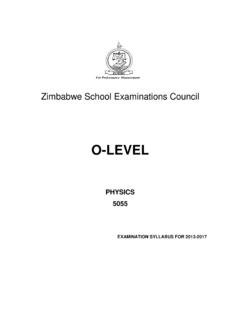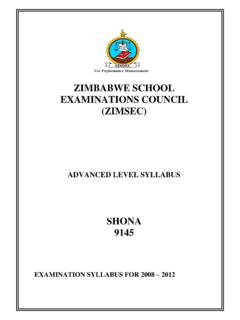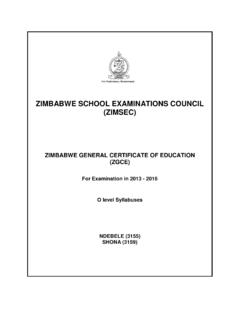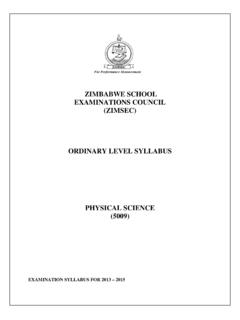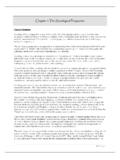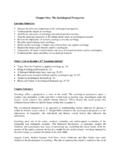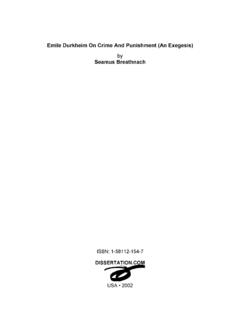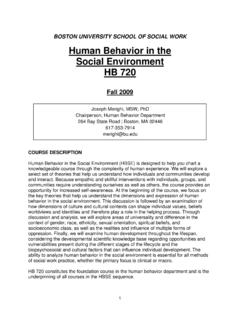Transcription of ZIMBABWE SCHOOL EXAMINATIONS COUNCIL …
1 ZIMBABWE SCHOOL EXAMINATIONS COUNCIL (ZIMSEC) ADVANCED LEVEL SYLLABUS SOCIOLOGY 9157 examination SYLLABUS FOR 2013 - 2018 PREAMBLE This syllabus is intended to provide a course in Sociology at A-Level, which fosters the development of an understanding of the diversity and complexity of human societies with particular reference to ZIMBABWE . This two year course should stimulate an awareness of traditional and contemporary societies, focusing on social, cultural, economic and political issues.
2 Emphasis should be put on the importance of examining these issues in a well reasoned and analytical way. AIMS Set out below are the suggested aims for the Advanced Level Sociology Syllabus (9061) for the purposes of EXAMINATIONS . The syllabus should therefore be able to:- stimulate an awareness of sociological concepts, theories , methods and research findings. stimulate awareness of the range and limitations of sociological theory and research. study sociological principles, perspectives and their applications.
3 Develop an understanding of sociological methods, including the collection, analysis and interpretation of data. encourage candidates to explore and appreciate the relationship between sociological findings and contemporary socio-political and economic issues. develop skills of sociological communication, interpretation, analysis, synthesis and evaluation. promote an appreciation and understanding of individual, social and cultural diversity. promote an understanding of continuity and change in social life. ASSESSMENT OBJECTIVES These assessment objectives should be able to assess the relevant competence candidates are expected to acquire by the end of the two year course.
4 The course should provide valuable understanding of human societies, form the foundation on which students could be productive members of society, and also provide the foundation for further education in higher institutions of learning. Knowledge and Understanding Candidates should be able to: offer definitions and explanations of relevant sociological terms and concepts; demonstrate appropriate knowledge of relevant principles, theories , and methods; demonstrate awareness of relevant sociological arguments through debates and research; discuss the theoretical and practical considerations influencing the design and execution of sociological enquiry.
5 Outline the findings from relevant sociological studies and research data. Interpretation and Application Candidates should be able to: interpret qualitative and quantitative sociological data presented in a variety of forms. recognise the special character of sociological knowledge and distinguish it from the knowledge and understanding produced by other academic subjects such as biology and psychology; identify and explore the links between relevant sociological concepts, theories , and research findings on social issues, select and use sociological material appropriately to analyse topical and relevant arguments and debates; apply concepts, theories and evidence to support arguments and conclusions.
6 Analysis, Synthesis and Evaluation Candidates should be able to: evaluate strengths and limitations of particular sociological theories and methods; analyse and assess sociological and non- sociological evidence and arguments; reach conclusions based on a reasoned consideration of evidence and arguments; recognise limitations and bias in evidence, and distinguish between fact and opinion. SCHEME OF ASSESSMENT Table I: examination Papers Paper Type Duration No.
7 Of Questions Max Mark Weighting 1 Section A: Structured Question(s) Section B: Essays 3 hours Answer all in Section A and any 2 from 5 in Section B 75 50% 2 Essay Questions 3 hours Answer 3 out of 10 75 50% Paper I will test syllabus units 1 to 5. Paper 2 will test syllabus units 6 to 10. The first examination will take place in November 2003 and every June and November sessions thereafter. Description of Papers Paper 1 The paper will be presented in two sections. There will be structured questions on Methods and Perspectives in Section A and Essay Type Questions in Section B.
8 Candidates will be required to answer all questions from Section A and any two questions from Section B. The examination will be of three hours duration. Paper 2 The paper will be presented in five sections. There will be two questions in each section. Candidates will be required to answer a total of three questions, selected from any three different sections. The examination will be of three hours duration. Specification Grid The relationship between the Assessment Objectives and the individual components is detailed in Tables II (Specification Grid) and III (Weighting) below.
9 These objectives are weighted to give an indication of their relative importance, rather than to provide a precise statement of the percentage mark allocation to particular assessment objectives. Table III: Specification Grid PAPER 1 PAPER 2 Assessment Objectives Section A Section B X X X X X X X X X X X X X X X X X X X X X X X X X X X X X X X X X X X Weighting 50% 50% Table III: Weighting Assessment Objectives and Skills Paper 1 Paper 2 Average Knowledge and Understanding 40% 30% 35% Interpretation and Application 30% 30% 30% Analysis, Synthesis and Evaluation 30% 40% 35% Total 100% 100% 100% SUBJECT CONTENT Unit 1.
10 Sociology as a Discipline This unit introduces candidates to key concepts and theories associated with a sociological understanding of human behaviour. The aim is to begin to explore the nature of sociological enquiry and the insights it provides into the relationship between individuals and social structures. Introduction to Sociology - The sociological imagination ( Mills 1959). - Sociology as a reasoned and rigorous study of social life. - The relationship between sociology and other social science subjects.
